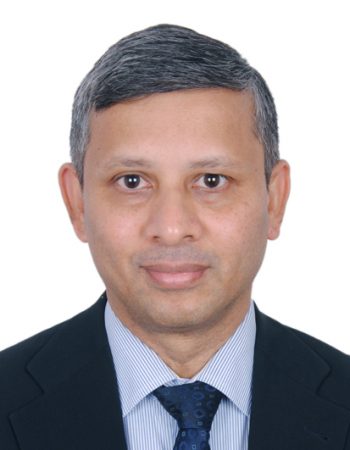World Liver Day: Interview with Dr. Ravichand Siddachari
 The organ liver of the human body is the second largest and the most complex organ other than the brain. In fact liver is considered to play a crucial role in our body’s digestive system. According to the medical experts liver is critical for survival and good care must be taken to avoid damage to liver, to spread awareness about this vital organ the World Liver Day is observed every year on 19 April to spread awareness about the liver diseases. On this occasion our correspondent Odeal D’Souza spoke to Dr. Ravichand Siddachari about the liver diseases, their symptoms and treatments.
The organ liver of the human body is the second largest and the most complex organ other than the brain. In fact liver is considered to play a crucial role in our body’s digestive system. According to the medical experts liver is critical for survival and good care must be taken to avoid damage to liver, to spread awareness about this vital organ the World Liver Day is observed every year on 19 April to spread awareness about the liver diseases. On this occasion our correspondent Odeal D’Souza spoke to Dr. Ravichand Siddachari about the liver diseases, their symptoms and treatments.
Dr. Ravichand Siddachari is currently working with the Manipal Hospital, Bangalore. He is Chief of Transplant and Hepato-biliary Surgery. After pursuing Masters in Surgery from Tata Memorial Hospital (Mumbai) he completed specialist training in surgical oncology followed by fellowship in Head and Neck and GI oncology. Thereafter he pursued his fellowship in the liver transplantation and GI surgery in Dublin, Ireland. Dr. Ravichand specialises in surgical oncology, liver transplantation and hepato-pancreatico-biliary surgery. Dr. Ravichand is also an expert in dealing with cadaveric and living donor liver transplantation; pancreatic transplantation; liver surgery; bile duct and pancreatic surgeries; neuroendocrine disease; primary liver cancers and cholangocarcinomas; and liver resection for metastatic diseases.
Q. What is the current status of liver diseases in India and in the world? Please shed some light on the statistics, is it increasing or decreasing?
Liver diseases are increasing in India and worldwide. According to the World Health Organisation (WHO) data 2,59,749 patients died due to liver diseases in the year 2017. Liver cancer (Hepatocellular carcinoma) is the fifth most common cause of death in UK. Liver diseases are second most common amongst the digestive diseases in USA.
Incidence of fatty liver is increasing rapidly due to lifestyle. In India, the fatty liver leading to cirrhosis (chronic
liver failure) is probably as common as cirrhosis due to alcohol. By 2030 liver diseases will be as common as diabetes and hypertension with at least one in five persons suffering from liver diseases.
Q. What are the causes by which ones liver can gets affected with diseases?
The causes of liver failure are many. Important causes are alcohol; viral diseases such as hepatitis A, B, C and E; Non-alcoholic fatty liver disease; autoimmune liver disease (one’s own immunity attacks liver similar to rheumatoid arthritis, Crohn’s); genetic disorders such as Wilson’s and Hemochromatosis. In children it is commonly due to inborn error in the formation of bile duct (Biliary Atresia) and defect in some of the enzymes.
Q. At what age is one prone to being attacked with liver diseases?
Liver diseases can affect any age group starting from the new-born to the elderly. Metabolic and genetic diseases are more common in children. Auto immune hepatitis is more common in women in middle age; hepatitis B and C can occur in any age, however we see them more commonly in the middle age; alcoholic cirrhosis is more common in men between 40-60 years and recently even younger people are affected; incidence of fatty liver leading to cirrhosis is equal in both men and women and they usually present in their fifth decade. Liver cancer is seen more in men between the ages of 40-60.
Q. Please tell us about liver transplantation and the latest technologies that are involved with treating liver? What is the success rate in India today?
In liver transplantation, the damaged liver is removed and the new liver is replaced. The new liver can be either from a person who is suffering from irreversible brain damage (cadaveric) or from a related donor who is alive. In case of a living donor half of donor’s liver is harvested and implanted into patient and in the cadaveric transplantation whole liver is implanted. This is possible because liver has the unique capacity to grow and it can grow back to almost normal size in 2-3 months. It is one of the most complex surgeries but due to advancements in the medical science and technology the success rates are high roughly about 90-95 percent. During the 70s and 80s the results of liver transplantation was not that good. However with the invention of modern equipment’s for the surgery and anaesthesia the results have improved dramatically. The ICU care has made a big difference in improving the results.
Moreover the medicines used for rejection (non-acceptance of the new organ by the body) currently are extremely good. Liver rejection is not so common compared to other organs such as kidneys, heart and lungs. Finally, our own experience in this field has certainly contributed to big success.
Q. How is India equipped with treating the liver diseases? Are there enough facilities and latest technologies required in place?
India is very well equipped not only with all the modern facilities but also our doctors are one of the best in the world. We are at par with any developed country in treating the liver diseases. We have everything on earth and just like any new software developed is available in India, any new gadget or medicine developed anywhere in the world is available here.
Q. What are the symptoms one has to watch out for in terms of liver diseases?
Unfortunately, there are no early symptoms of liver damage which is the reason for most patients presenting too late. Symptoms appear only after more than 50 percent of liver is damaged. Initially a person may feel I am getting tired too soon or I have no energy. Also there will be some indigestion or low appetite. If these symptoms persist for a longer period for more than two weeks then one should consult a doctor and get their liver examined along with the other tests. As the damage progresses other symptoms start manifesting such as swelling of the feet or belly, altered sleep pattern and jaundice.
Symptoms of liver dysfunction:
o Fluid build-up in the belly (ascites)
o Fluid accumulation in the legs and the body( oedema)
o Jaundice
o Weakness
o Confusion, altered sleep cycle (encephalopathy)
o Vomiting of blood or passing of black stools
Q. What are the precautions to be taken to keep our liver healthy?
Good diet, exercise and avoidance of alcohol are very important to keep liver healthy. A balanced diet is very important. Avoiding junk, unhygienic and processed food is extremely important. Fruits and vegetables should be in plenty and carbohydrate based diet should be avoided. Regular exercise keeps all the organs in a good shape. As you know fatty liver is one of the leading causes of cirrhosis and exercise reduces fat accumulation in the liver. Drinking alcohol is injurious to health and liver is the first organ to get affected. Liver is mirror of a good health and longevity.
Persons with diabetes should get the liver checked regularly as they are prone for liver diseases. Everyone should get checked for Hepatitis B and C and vaccine is available for Hepatitis B. People who are taking some of the medicines such as TB medicines, medicines for the seizures (epilepsy), on pain killers for a long time should get the liver checked.
Q. What are the new advancements in medicines/treatments that have come up to treat the liver diseases off late?
Treatment of Hepatis B and most recently Hepatitis C have been boon for us. Liver transplantation, once believed as unsuccessful operation, has evolved so much that the results are getting closer to 95 percent and above. This is due to overall improvement in the medical science, technology and to understanding the disease in depth.
Liver diseases are increasing due to lifestyle, pollution and consumption of alcohol. It can be called a disease born out of modernisation. As mentioned earlier liver is a non-complainer and symptoms appear only after significant portion of liver is damaged. People at high risk are those drinking excessive alcohol, having sedentary life style, obese and diabetic patients, patients with hepatitis B and C. They should have regular check-up. Liver cancer is the fifth most common cause of death and people with liver problems should get screened for liver cancer and should also be under surveillance. Most cancers spread to liver but treatment of metastatic liver cancer can keep them alive for long time.
Q. What is your message to the people on the occasion of the World liver day?
Good liver is the key to good health. Jigar (in Hindi/urdu) means a friend and liver is literally a friend who keeps one well and liver is the organ which gives one longevity, a glow to ones face ( persons with liver diseases look old and loses skin lustre). Therefore keep the liver healthy by practicing a healthy, hygienic, natural diet; exercise regularly and avoid alcoholic drinks.
















Add comment